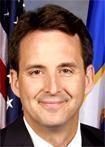Another $3 million for Union bosses
Ben Brubeck, writing at the Daily Caller, takes notice of another $3 million handout to the union bosses. Unfortunately, it is just the tip of the iceberg:
Congratulations, Mr. and Mrs. Taxpayer, you just gave Big Labor a $3.3 million tip. Not for exceptional service, mind you. Just for wearing the union label.
As part of the flood of taxpayer cash approved by the American Recovery and Reinvestment Act (ARRA) of 2009, the federal government has about $140 billion worth of federal and federally assisted construction projects to fund and oversee. Most of us would expect that such projects would be awarded to qualified bidders based on whichever contractor submits a bid delivering to taxpayers the best work at the best price.
But that has not been the case under the Obama administration.
After receiving major political dollars and support from Big Labor, President Obama signed Executive Order 13502 just 16 days after taking office. The order repealed a prior executive order in effect since 2001 that kept the government accountable by prohibiting government-mandated project labor agreements (PLAs) on at least $147.1 billion worth of federal construction projects. It had also ensured fair and open competition on hundreds of billions of dollars of important federally assisted schools, jails, bridges, roads and sewers in communities across the United States.
Now, taxpayers are stuck with an executive order that encourages federal agencies, whenever possible, to require a union-favoring PLA on projects exceeding $25 million in total cost.
Think of a government-mandated PLA as a stimulus package for Big Labor at the expense of taxpayers and the construction industry’s non-union workforce. PLA schemes discourage competition from qualified non-union contractors and ensure that most or all the workforce building the federal project will be union members hired through union hiring halls. Such favoritism steers lucrative federal contracts to unionized contractors and is especially appalling since just 14.5 percent of the U.S. private construction workforce belongs to a labor union.



